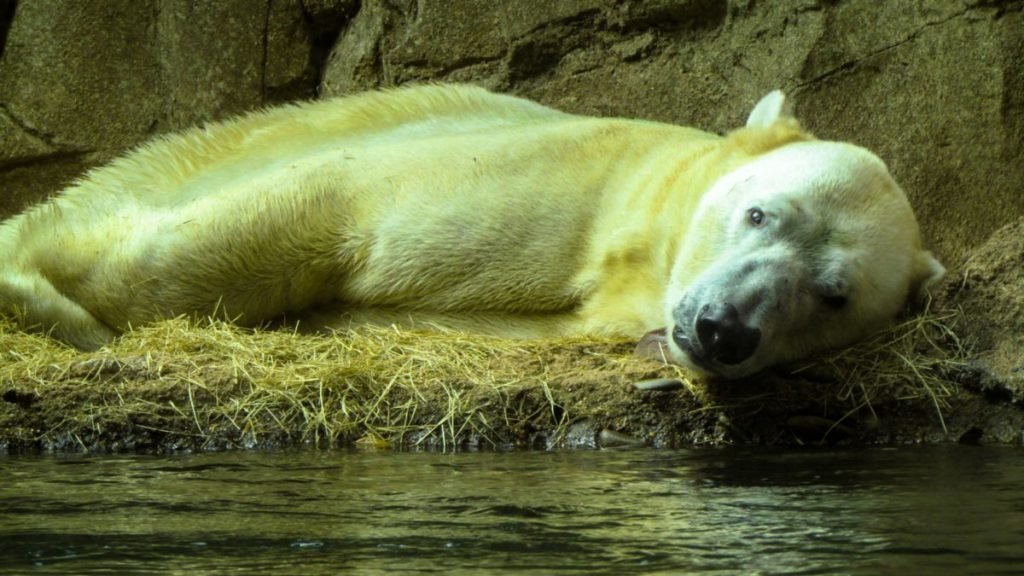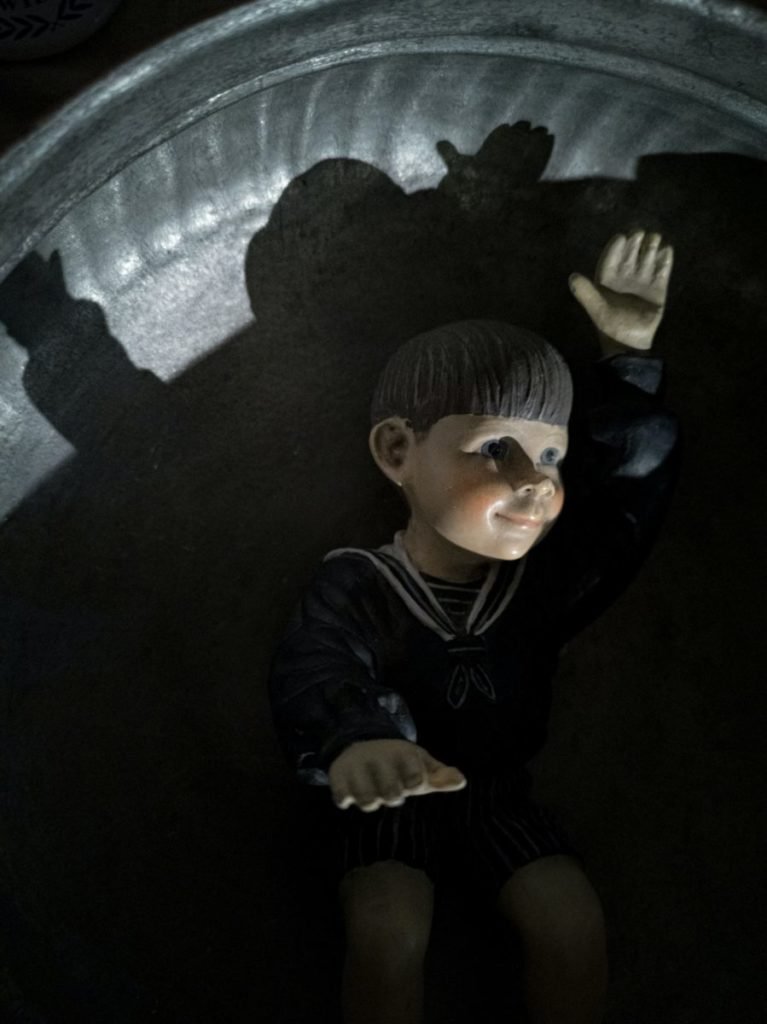
Erik awakens full of pain, lying in a hospital bed in a propped position, his throat sore from the tube that snaked down into his mouth and nose, his limbs heavy and bruised. His head feels like it belongs to someone else. The lights are low in his hospital room and he hears the soft whir of machines. No one is in the room with him that he can see. Panic floods his heart as he remembers the accident: the whirl of lights, the spinning crush of metal. And ten-year-old George, his son, in the passenger seat.
Erik lurches up, gasping, in the bed. His body catches fire. He cannot turn his head very far, but there, on a chair in the room, someone sits. Out of the corner of his eye, Erik sees him. It is George. It has to be George.
A nurse enters and smiles when she sees that Erik is awake. He grunts at her, tries to gesture toward George. If only he can hold his son. There is a great careening clatter in his head and an icepick headache buries itself in his skull. The nurse soothes him, running a cool gloved hand along his cheek, whispering that he should rest, that his vitals are solid, that he is very lucky indeed, that he will likely recover physically, though his concussion is significant. Erik chokes, trying to get the word out. His eyes zigzag between the nurse and George, who remains sitting still as a statue on the chair.
Why does George not come to him?
The nurse shushes him again and presses a button, and a thick and heavy feeling flows into Erik’s body. He feels it pulling him under. His eyes fight it. The nurse looks at him, sees his still darting eyes, then she looks to the chair.
Someone left that, she says. A visitor. Here, you can hold it.
Erik falls asleep as the nurse wedges George, his body now impossibly soft and barely thirty-six inches tall, into the crook of his arm.
Erik does not dream.
Erik leaves the hospital with George still in the crook of his arm. He has not set George down for a second, though someone, perhaps the nurse, had been cleaning George while Erik slept. Erik had shared his food with George, though George would not open his mouth. The boy has changed, become plush and immobile, a smile stitched on his mouth. People watch Erik as he passes, great wells of tears in their eyes, or bursts of laughter quickly muzzled. He does not notice them. Those first several days he does not notice much of anything. He is grateful to be alive, to have his son in his arms.
His headaches are bad and his memory is shaky. All he wants is to be left alone. But there are forms and depositions and gruesome details. He floats through all of it, gritting his teeth against the flashes of pain. George stays wedged in his elbow.
Eventually things settle.The other driver is found at fault. Erik’s medical bills are paid. He starts an account in case George wants to go to college, puts all the money in there except for a month’s rent and expenses. Someone comes by from time to time to help him do his bills, which he tries to pay diligently but sometimes forgets. He finds a new job, since computer screens spark firecrackers behind his eyes, in the donation warehouse of a secondhand store.
On a cold December morning a year or so later, Erik is kept busy by a steady stream of cars at the donation center. His jowly cheeks flame pink in the chill. He stands under an awning, helping people unload their belongings, bundled up in mittens and a flannel tam o’shanter with ear flaps that used to belong to his father. Erik sometimes thinks he can still smell cigar smoke on the hat. Erik himself smokes cigarettes now. They help pass the time. George sits motionless in a chair nearby. Erik brings him to work everyday.
One young woman leaves a whole bag of feather boas. A man drops off three VCR’s and a box of Disney VHS tapes. There are stuffed animals, including a polar bear Erik sets aside for George, plus shoes and toaster ovens. Erik asks each patron if they want a receipt. Full carts line up like toy soldiers in the warehouse, awaiting sorting. He’s sweating, despite the cold.
As he shuttles back and forth between cars, Erik thinks of the leftover birthday cake he brought with him for lunch. He celebrated his fiftieth birthday yesterday. His hair has turned ash gray, though his curls are still thick and wiry. He made himself a cake and watched George watch him blow out the candles. He cut George a piece of cake and fed it to him, but George, as always, wouldn’t eat and the cake and icing just stained his face. Erik still tries to feed George at every meal, just in case the boy decides he wants some for a change. Erik cleaned George up and took their picture on an old disposable camera that he’s had for ages: both of them smiling, plates of cake in front of them. Erik hopes it turns out just like the picture of him and his own father, Clyde, taken when Erik was young, smiling in front of his dad’s birthday cake. Erik’s mother is out of frame, but you can see her shadow falling over the table, just next to Clyde. Erik keeps that picture in a frame on a bookshelf. It’s a little dusty, come to think of it. But he can’t wait to print this new picture out and put it on the fridge. He works fast, faster than usual, taking fewer breaks, eager to get through the day and off to the pharmacy to print the picture.
He enjoys the work when it is busy. He does not think of the hospital.
Erik doesn’t know who brought George to his hospital room, nor the reasons for George’s transformation. His son had been an athletic boy who loved basketball, who laughed loud and long until he got hiccups, who was ticklish under his ribcage. George loved animals, especially polar bears, and he once did a school project about the melting arctic ice sheets that had made Erik’s heart feel too big for his chest, though it’s hard for Erik to recall such things now. That his son could love the world so much. That he could care enough about something so far away. If he could, he would remember how George’s face got red, not from embarrassment but from emotion, how his hands shook, how he banged the desk with a book. Everyone listened to George, and Erik started biking to work the next day.
And he would remember too one time the two of them went to the zoo to see the polar bears when George was seven. How excited he had been to see his favorite animal in real life, and how the polar bear had lumbered over toward the glass. Its big eyes had scanned them, George with his face pressed to the glass. But the bear turned away and began to pace, the same small arc of dirt and they stood and watched until George began to cry. As Erik took George’s hand, the bear lay down and hmmphed a big sigh with its eyes closed. They went back to the car and George never wanted to go to the zoo again. But the memory isn’t really there. It’s more of a blur of feeling, and the new George has taken the old George’s place in Erik’s mind.
A car swerves fast through the parking lot and lurches to a stop under the alcove. A man with sunglasses pops the trunk and stays in the car while Erik unloads three heavy boxes. They’re full of big band vinyl records with faded covers that make Erik think of his dad. The two of them used to listen to Clyde’s records, and sing songs together, old jazz standards or folk songs. Clyde played guitar and Erik sang along in his child’s falsetto. They recorded themselves on a little tape deck.
After Clyde died, falling asleep at the wheel, Erik looked for the tapes but couldn’t find them. His father had given away much of his belongings before that. This was when George was just a baby. The ache of knowing George didn’t know his grandfather, and vice versa, lurks somewhere in Erik’s stomach, still. This feeling no bigger than a hazelnut, but it’s there. It feels almost real enough to press on.
Erik doesn’t really think about how he didn’t get to grieve his father because he was too busy being a father himself. But it’s true. He had to bury it because he was raising a baby. The grief dissolved into him somehow. He wouldn’t know where it went. Sometimes he doesn’t even remember it’s there, though of course it lives in him. His wife had had a bad father and she didn’t really understand how Erik and Clyde’s relationship worked. She left, eventually, moved to Arizona to live in the desert. She’d started worshipping crystals and doing other things that Erik never understood. He let her go and she let him keep George.
The tape of them singing was gone but Erik did get his father’s record player and some of his records. The music always makes him feel better, both happier and more fully sad. Yesterday, on his birthday, Erik turned the music up loud and twirled George in a circle until Erik collapsed, laughing and out of breath, on the couch. George smiled his unchanging smile and Erik squeezed his son’s soft body until he fell asleep.
Erik brings George inside to take his morning break. A co-worker, Andy, a tall man with a goofy, crooked smile, takes over. He nods at Erik and doesn’t look at George. Some people are like that. Andy’s plenty nice, Erik thinks, but it bothers him. Erik heads to the breakroom and sets George down in a chair while he buys a Coke from the vending machine. He thinks again about eating his cake but decides to save it for lunch.
His manager, an older Black woman named Kathy, walks in. She smiles at Erik and reaches down to pat George’s head. Her fingernails are painted with tiny Christmas trees. She always paints her nails to match whatever holiday is approaching: tiny pumpkins for Halloween, fireworks for the Fourth of July. How are you two doing today? she asks Erik. Erik nods and blushes. Kathy’s kindness always makes him feel like a puddle. Someone pages her over the loudspeaker. She pats George on the head again and says to him, You keep your dad out of trouble now. She leaves the room. Erik finishes his Coke and takes George to use the bathroom. Then he heads back outside to relieve Andy.
The cars keep coming. Andy stays on to help unload for another half an hour. Andy hurts his back lifting a heavy box and has to leave. Kathy sends him to the doctor. Another employee drives Andy away. Kathy shakes her head and touches Erik’s arm. She says that they’re shorthanded but she knows Erik can handle it. If he needs to take a break, just put the “back in five minutes” sign up and head inside. She turns to go, then pauses. Her eyes are sad. She says someone complained about Erik taking George into the bathroom. She doesn’t know who. But from now on, George should sit somewhere else when Erik goes in to pee. Erik nods. That’s fine. George can look after himself. She nods at George and goes inside.
The cars stretch on for what seems like forever. Finally, mid-afternoon, there is a lull. Erik decides he’ll leave George in the chair. The boy seems to like the fresh air. He puts the donated polar bear in George’s lap and hangs up the “back in five minutes” sign, and he rushes inside to use the bathroom.
When Erik gets back to his post at the drop-off, there are three cars waiting for help. Someone honks as he heads towards the first car. Then he spots George’s chair.
It’s empty.
Erik’s feet feel like they are wrapped in cement. Panic floods through his body. Roaring sobs fight to come up, sticking in his throat. A drowning feeling rises in his chest.
The cars are honking, the people in the first car are waving and yelling, but he ignores them and runs out into the street. He spins, waving his arms, glasses fogging from the cold air.
He shouts. George. George. George.
A white van rumbles past, close, hot exhaust pumping into Erik’s face. He doubles over, coughing, and tries to shout. The driver yells something, hammers his horn. Erik feels the pressure in his chest growing. He falls to his knees. Pictures of George fly through his head. George climbing a tree in summer, dangling upside down from a low branch. George sleeping on the couch in their apartment, a small drip of drool on his lower lip, hair tousled, toes sticking out under a dark blue blanket. George smiling in the passenger seat, reaching for the dial to put on the pop radio station that Erik hated. Then Erik sees the world spinning around the car, and then he sees nothing.
The white van careens down the street. Erik can’t move.
An old maroon station wagon buzzes past him, honking, and there, in the backseat, pressed between a child and the window.
George, with the polar bear still pressed next to his side.
Erik watches, still on his knees in the middle of the street. George, smiling his constant smile, disappears as the car turns the corner. Tears run down Erik’s cheeks, but it feels like someone else is crying, or like they’re older tears he’s been storing in a hidden part of himself. As he cries he feels the drowning feeling in his chest ease and something emptier, simpler, begins to take its place.
He hears cars honking, far away, as if it’s coming from the other side of an apartment wall. A hand touches his shoulder. Kathy is there. She leans down beside him, rubs his back. Erik tries to nod but can’t. Kathy tells some others to handle the cars.
He sits in the middle of the road with Kathy for a long time. A few other employees come out, gather around Erik. They direct cars around the spot where Erik sits. It’s quiet, except for the cars, and the cold December breeze. Erik sits in the stillness, surrounded by his shivering co-workers, crying tears that feel a whole year old and many that are even older. No one speaks.
Kathy stands up, offers Erik a hand. Erik wipes his nose on his sleeve and looks at the trees on her fingertips. He reaches out and grasps Kathy’s hand. She helps him pull himself upright. The cars keep moving slowly around them. Eventually, she leads Erik inside, tells him to clock out and clocks out herself. There’s a line of cars stretching along, waiting for their donations to be taken, but none of the employees pay any attention. Finally a man hangs up a “closed” sign and walks down the line of cars telling people to go home.
As Kathy helps Erik get ready to leave, she notices the camera in his coat pocket. Together, they walk into the pharmacy and hand the small plastic rectangle to the man at the photo counter. He laughs, says he hasn’t seen one of these in a while. The pictures will be ready in an hour, and they return to the breakroom where Kathy opens Erik’s birthday cake and slices it in half. Erik eats, though he cannot taste it.
When the photos are ready, they walk back across the street and retrieve them. The newest are at the top. The picture of Erik and George with the birthday cake is fantastic. Erik smiles and cries at the sight of it. It is perfect. He leaps up, ready to chase the maroon station wagon across the country if he has to.
Kathy motions him to sit. Show me the other pictures, she says. Erik sits, though the breath is still heaving out of him in gasps. Kathy takes the pictures and holds them, asks Erik to tell her about each one. There’s George in the crook of his arm. There he is smiling his unchanging smile in their big lounge chair. There he is dressed up as a pumpkin for Halloween, his soft stitched face poking out from the orange costume. Erik tells her about each of them.
They are almost done with the pictures when there is suddenly one of George as he was before. Erik lifts the picture with trembling fingers. A tall, athletic boy with sandy hair and a sloping nose. He’s inside, lying on the couch, bare feet crossed at the ankles, legs pocked with mosquito bites. In his hands, George holds a record, one of Clyde’s, Duke Ellington smiling on the cover. George has his head thrown back, mouth open in a laugh.
And Erik can hear it. The laugh. George’s voice. How he’s missed his son’s voice. That voice that sounded the way Erik imagined his own still sounds on that lost tape of him singing with Clyde. The picture falls from his hand and floats to the table. Kathy picks it up and looks at the picture for a long time. She places the picture back in Erik’s hand and closes her fingers over his. In his ears, George’s laugh rings and rings. Erik is sure it will never stop.


Share this post with your friends.

